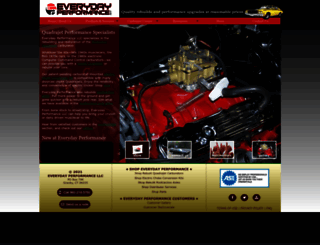Everyday Performance Rebuilt Rochester Quadrajet Carburetor Positraction Axle Store
Page Load Speed
1.2 sec in total
First Response
113 ms
Resources Loaded
877 ms
Page Rendered
161 ms

About Website
Click here to check amazing Everyday Performance content. Otherwise, check out these important facts you probably never knew about everyday-performance.com
From bone stock to street or sport, Everyday Performance can help you bring your cruiser or daily driven muscle to life
Visit everyday-performance.comKey Findings
We analyzed Everyday-performance.com page load time and found that the first response time was 113 ms and then it took 1 sec to load all DOM resources and completely render a web page. This is quite a good result, as only 20% of websites can load faster.